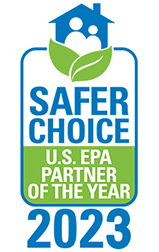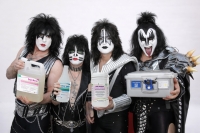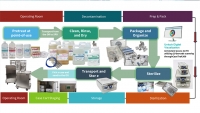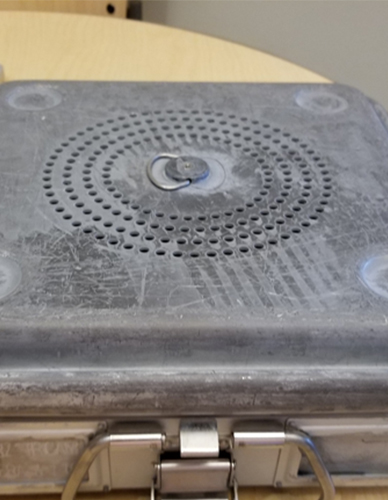
The Problem: Corroded Containers
Yes, it happens to ours too. Over the past month or two, we’ve learned that several facilities and health care systems have standardized on using germicides, environmental wipes, that EPA reviews through their pesticides division for cleaning our containers and other medical devices. Most of these disinfectant wipes are carriers for highly caustic solutions with pH >11 or composed of quaternary compounds considered hazardous to human health. And they are not rinsed off! Thus, damaging the surface and functionality of devices shortening the life span. While wiping devices down may seem like an effective method of decontamination, after all it is easier and appears to save time over running devices through the washer. But remember the old adage, “If it ain’t clean, it’s not sterile.” Importantly without a rinse the "pesticide" remains on surfaces and continues to degrade the material. For medical devices, the chemical residue can now can react with the sterilant causing failures and potential patient concerns.
The Background: Our Journey
For decades, Case Medical’s SteriTite container manufactured from high purity aircraft grade aluminum, anodized and passivated for durability and corrosion resistance has proven to be compatible with all sterilization modalities. Nonetheless, using caustic cleaners can reduce the lifespan of the device. We developed our instrument chemistries when a colleague from a sterilizer company suggested that we develop a pH neutral enzymatic cleaner to preserve the life of his company’s sterilizer, our container system, and the many devices that were damaged with caustic cleaners. We took up the challenge, the market asked, and we responded developing a full line of EPA certified cleaners and solutions, and awarded six times as a U.S. EPA Safer Choice Partner of the Year.
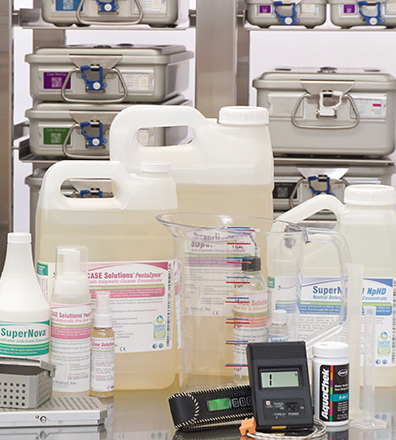
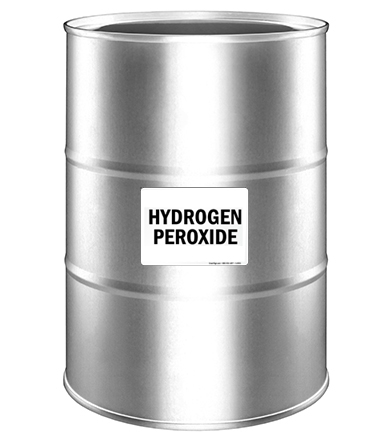
Material Compatibility with a Twist: Aluminum and H2O2
Aluminum and hydrogen peroxide are compatible materials. In fact, for long term storage, aluminum is considered the very best material for storing H2O2. Even low temperature sterilizers with concentrated, vaporized hydrogen peroxide are lined with aluminum. So how can anything interfere with aluminum containers? This is not the case when pH neutral cleaners are used. It is a major factor when the wrong chemical agent is applied for cleaning or surface disinfection. It becomes a perfect storm of factors when an alkaline cleaner is used repeatedly or a disinfectant is applied without rinsing. It corrodes containers which shows a range of discoloration from gray to black and the highly durable surface treated to be as hard as a sapphire now has deep scratches.
Reuse or Replace
The circular economy is a system based on the reuse and regeneration of materials or products especially as a means of continuing production in a sustainable or environmentally friendly way. You do not have to “throw the baby out with the wash water” or replace reusable equipment without at least an attempt to repair it. At Case Medical, we consider the sustainability of our planet, the safety of our workplace and look for ways to avoid unnecessary replacement and waste. We look to contribute to the circular economy with products and solutions that save money for your facility and increases the useful life of medical devices. Reusable materials contribute to sustainability and are kept within the economy to be used again and again creating further value.


Our Recommendations
First, we manufactured pH neutral Case Solutions and SuperNova cleaners that are free rinsing, non-corrosive, and validated for effectiveness. Then, we developed a pH neutral enzymatic wipe, PentaWipes, for manual cleaning and pre-treatment. This week, we introduced a variation on the theme, a pH neutral non-enzymatic wipe, Case Prep Wipe, for those who prefer detergents without enzymes or are using environmental wipes on medical devices. Next week, we will have available another new product, a Rinse Wipe with critical water to address the rinsing dilemma.
Meanwhile, for accounts with compromised containers, there is still a way to repair the surface of your degraded container. Clean the surface of the container with one of our pH neutral cleaners or wipes. Rinse. And now sterilize in an autoclave for 8 minutes. This just might be “what the doctor ordered” to close the open pores with a seal that can repair the surface of your SteriTite container. Of course, don’t go back to bad habits. Wash and rinse reusable devices after use, including our containers and avoid off label products.
Here’s a link to our IFU and an app to have it accessible whenever needed.
Here’s a link to our IFU and an app to have it accessible whenever needed.
Visit us anytime at www.casemed.com to learn more about our products and services. We are here to help. Case Medical is a U.S. EPA SAFER CHOICE Partner or the Year for Manufacturer Formulator and recognized in NJ as Innovative Manufacturer of the Year.
Use the comment section below, or email us at [email protected] if you want to learn more about the circular economy and how Case Medical can help your facility be more sustainable and provide solutions to problems you are facing.
Kindest Regards,
